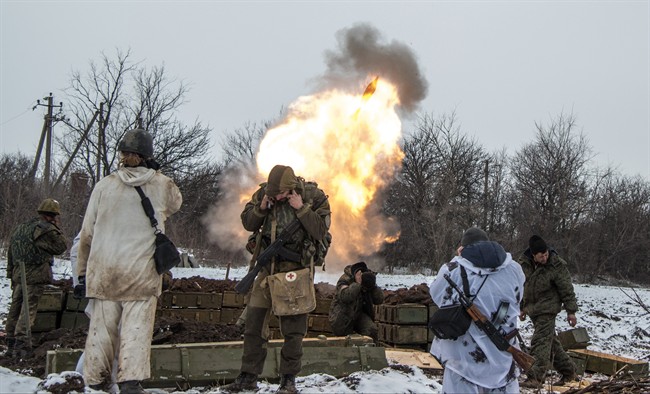MINSK, Belarus – Leaders of Russia, Ukraine, France and Germany were struggling to reach a deal Thursday morning in the 15th hour of talks aimed at ending fighting in eastern Ukraine.

Officials have remained tight-lipped, praising progress but would divulge details. In the morning, the leaders briefly left the session hall but later came back to continue negotiations.
The Ukrainian Embassy in Kyiv said a deal under preparation envisages a cease-fire starting from Saturday and the creation of a buffer zone, but gave no further details.
More than 5,300 people have died since April in the fighting between Ukrainian forces and Russia-backed separatists in two eastern provinces and the bloodshed rose sharply in recent weeks.
Despite the ongoing talks, both rebels and government troops reported fighting across eastern Ukraine.
As President Barack Obama considers rising calls at home for sending U.S. lethal aid to Ukraine, European leaders fear that would only aggravate the fight. Russia, meanwhile, faces a severe economic downturn driven in part by sanctions the West has imposed for supporting the separatists with troops and equipment, which Russia vehemently denies it is doing.
The urgency felt by all sides appeared to be underlined by the extraordinary length and discomfort of the talks among German Chancellor Angela Merkel, French President Francois Hollande, Ukrainian President Petro Poroshenko and Russian President Vladimir Putin.
READ MORE: Fighting in Ukraine continues ahead of peace talks
They sat down with each other Wednesday evening in the Belarusian capital and the talks continued through the night as crowds of reporters waited anxiously in a marble-floored, chandeliered convention hall in Minsk.
- Peel police chief met Sri Lankan officer a court says ‘participated’ in torture
- Budget 2024 failed to spark ‘political reboot’ for Liberals, polling suggests
- Wrong remains sent to ‘exhausted’ Canadian family after death on Cuba vacation
- Liberals having ‘very good’ budget talks with NDP, says Freeland
Merkel is known for her ability to stay alert during late-night negotiations. This has proven to be a big advantage when she represents Germany at top-level talks where world leaders have to grapple with complex topics like climate change or bank bailouts.
Parallel to the leaders’ talks, rebel leaders were meeting separately with representatives of Russia, Ukraine and the Organization for the Security and Cooperation in Europe. Rossiya 24 television and the Tass news agency said the rebel chiefs refused to endorse a draft document agreed by the four leaders.
The French-German diplomatic blitz began last week when Merkel and Hollande visited both Kyiv and Moscow.
“The entire world is waiting to see whether the situation moves toward de-escalation, weapons pullback, cease-fire, or … spins out of control,” Poroshenko said Wednesday before sitting down for talks.
Russian Foreign Minister Sergey Lavrov signalled some progress, saying just before midnight that the talks were “active, better than super.” But it was unclear when a decision might be announced — and how soon the shooting would stop if an agreement is reached.
READ MORE: White House voices support for Ukraine peace talks in Minsk
A top rebel official, Andrei Purgin, told Russian television that it might take a day or more for hostilities to end even if a cease-fire is called.
Details of a possible peace deal haven’t been released, but key sticking points include:
- Drawing a new line of division: Ukraine wants the same one that was agreed upon in September, while Russia wants a new line that reflects the rebels’ significant territorial gains since then.
- Withdrawing Russian troops and equipment from eastern Ukraine: Russia says it does not have any troops and military hardware in the east, a stance scoffed at by Ukraine and NATO.
- Securing the Ukraine-Russia border: Ukraine wants to regain control of its border with Russia to stem the flow of Russian fighters and weapons, while Russia says that’s up to the rebels who have captured some key border posts.
- Giving the separatists more autonomy: Ukraine says it may offer them broad rights under Ukrainian law but Russia wants guarantees. Russia also wants Ukraine to end its financial blockade of the east.
Before heading to Minsk, Lavrov said the most important goal of the talks would be to implement a cease-fire, but warned that Ukraine could fully re-establish its control over the border with Russia only if it offers a degree of autonomy to the east and lifts its economic blockade.
“To give away the Russian part of the border also would be to cut them (the rebels) off even from humanitarian help and allow them to be surrounded,” Lavrov said.
Germany and France rushed to mediate after a recent surge in fighting.
In the rebel-held city of Donetsk, rebel officials said five people were killed and nine wounded in a shelling attack on a bus station on Wednesday. Officials in Kyiv said 19 troops were also killed in fighting in Debaltseve, a hotly contested transport hub in eastern Ukraine.
Poroshenko posted a statement saying he had made an impromptu visit early Wednesday to the eastern Ukrainian city of Kramatorsk, where Kyiv says 16 people were killed and 48 wounded in a rocket strike a day earlier. The city is 30 miles (50 kilometres) from the nearest front line.
“We demand an unconditional peace,” Poroshenko said. “We demand a cease-fire, a withdrawal of all foreign troops, and closing of the border. … We will find a compromise within the country.”




Comments